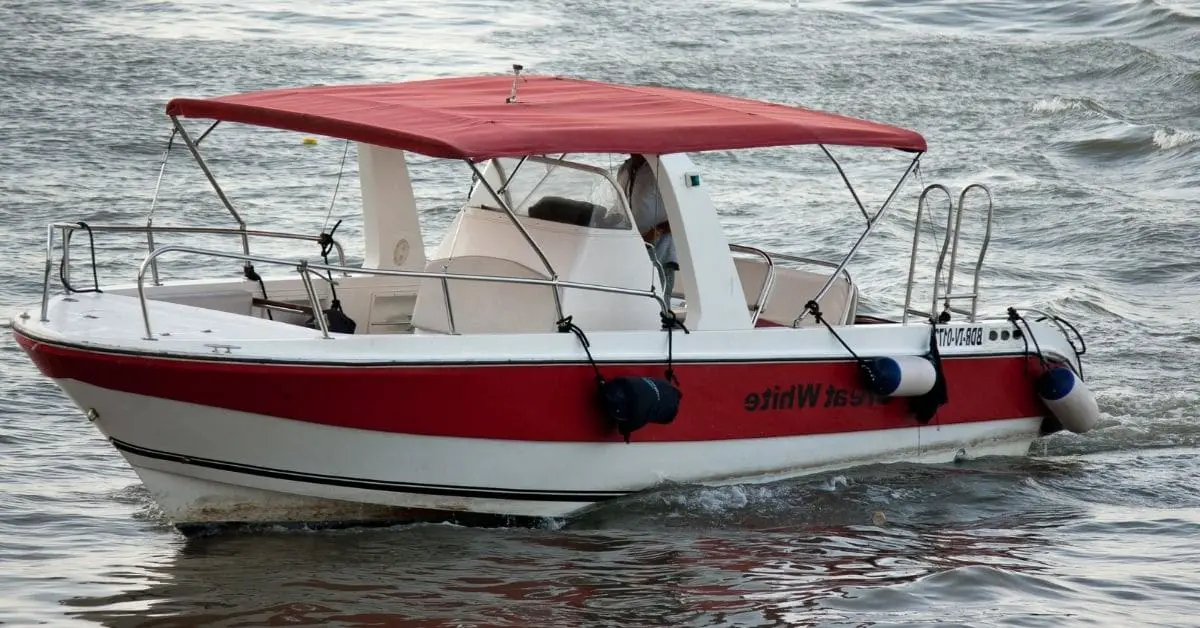Boats and motors are incredibly reliable if well maintained. However, if they aren’t maintained well, they will run into issues very early in their lifespan. Engines are the main culprit to these issues, but it could also be with other parts of the boat as well. So the answer to this depends, but here’s a simplified answer:
After about 1,500 hours of runtime, gas engine boats (inboard and outboard) will start to become unreliable. However, depending on how well or how bad regular maintenance was done, it may be more like 1,000-2,000 hours until they become unreliable. Diesel engine boats last around 5,000 hours.
(source)
So, although gas engines last up to 1,500 hours in general, once they reach 1,000 hours, they’re considered to have a lot of hours. This is because engine issues can become very common at this point, especially if they weren’t maintained well.
Always ask about prior maintenance if you’re buying an old boat and try to get it professionally inspected especially if it was used in saltwater. Annual engine service should be done once every 100 hours and hull maintenance should be done at least once every other year.
A gas engine boat (inboard or outboard) that’s maintained well will usually last 500-1,000 hours longer than if not maintained well.
How many years is a lot for a boat?
Most people use their boat around 71.5 hours per season, so it takes 21 years for a new boat engine (gas) to become unreliable on average. However, many boaters boat much longer than this, especially in areas such as Florida where boating season lasts all year.
On the high end of 200 hours per season, it will only take 7.5 years for a boat engine to reach 1,500 hours. 1,500 hours is the point where they generally become unreliable.
Boat reliability by the number of hours it has table
Below I made a chart of how reliable a boat will be after a certain number of hours. The chart mostly refers to gas engine boats. Diesel engines will last much longer.
| Hours | Is that a lot of hours for a boat? |
|---|---|
| 100-399 | The boat has plenty of life left and you shouldn’t have to worry about any serious issues until a long time. Just make sure to do proper maintenance in order to not run into any issues. |
| 400-699 | Almost all boats will still have plenty of life left unless they were maintained awfully. This is a great hour range for a used boat you’re looking to buy. |
| 700-899 | This hour range represents about half the lifespan of its gas engines. If the engines weren’t maintained well, you might start to experience slight issues. |
| 900-1,099 | Most boas in this hour range are starting to get on the old side. Not only will you have to worry about engine unreliability if it wasn’t maintained well, but also hull damage, rust, and corrosion. However, if the boat was well maintained, there could still be 500+ hours of life. |
| 1,100-1,299 | At this hour range, expect the boat to not be perfect. There will be maintenance issues you will face with the motor and hull. However, if it was well maintained, there could still be 400+ hours of life. |
| 1,300-1,499 | This is the hour range where the engines are going to start becoming unreliable, (diesel engines will still last a lot longer). So I wouldn’t recommend purchasing a used boat in this hour range unless you know for sure that the previous owner has babied the thing its whole lifetime. |
| 1,500+ | After 1,500 hours, gas marine engines start to become unreliable. So, boats in this hour range will almost certainly give you some headaches. Frequent maintenance will be needed, even while out on the water at times. |
How to find how many hours are on a boat
Most boats built within the last 20 years will have engine hours stored on the engine computer. This can be accessed by either a gauge or a diagnostic computer. Older boats will generally have an hour meter either on the dashboard or in the engine compartment.
(source)
All engines are different, so it’s best to read the manual for your specific motor if you can’t figure out how to find the hours.
What is the sweet spot for hours on a used boat you want to buy?
Obviously, the older the boat the cheaper it will be. So buying used is a great way to save money and still get a very high-quality boat. The sweet spot for age depends on factors such as motor/boat brand and how well it was maintained.
However, the sweet spot for a used boat is 400-700 hours. At this point, the engines (if gas) still have over half their life left and the boat will be 25-35% cheaper. At this age range, you also won’t be as badly affected by poor maintenance compared to if the boat was poorly maintained for a longer period of time.
Boats depreciate very slowly after they reach 40% depreciation. So getting a boat in the 400-700 hours range is a great way to avoid losing much money in depreciation while still having a lot of boating life left.
How long do boat hulls last?
The lifespan of boat hulls depends a lot on maintenance, material, usage, etc. Boat hulls used in freshwater also tend to last longer than in saltwater. This is because most people don’t take the time to desalt their boat after every use.
Although, on average most boats that spend their time in fresh water last around 15-30 years, while boats in salt water last 10-25 years. However, some boats may last 5-75 years depending on the material used and maintenance that’s done.
If we look at hull length based on material, it looks like this:
| Boat Material | Average Fresh Water Lifespan | Average Salt Water Lifespan |
|---|---|---|
| Fiberglass | 15-30 years | 10-30 years |
| Aluminum | 15-35 years | 5-25 years |
| Wood | 15-25 years | 10-25 years |
| Steel | 25-75 years | 20-50 years |
| Ferro-cement | 10-60 years | 10-40 years |
Note: Any boat can last well over these averages if they are maintained properly.
If you want to see more information about this topic, check out this article I wrote about it.
Do outboard, inboard, or jet motors last longer?
It is well known that marine diesel engines will last significantly longer than marine gas engines, but the research isn’t super clear on the different kinds of gas engines. Outboards, inboards, and jet engines are all expected to last 1,500 hours before they start running into issues.
However, it is clear that 4-stroke motors last longer than 2-stroke motors, especially when looking at jet engines. Old 2-stroke jet skis only would get around 200-300 hours until breaking down but many new ones can get over 500 hours. (source)
So, outboard, inboard, and jet engines all last around the same (1,500 hours). Although, inboards will usually last the longest because of how protected they are from corrosion and weathering. Outboards come in second, and jet engines come in last.
Jet engines are last because they are most likely to be abused by constant RPM changes (especially in jet skis), and there are much fewer reliable brands available. The most reliable jet engine brand is Yamaha.
What boat brands and motor brands last the longest?
Almost all of the well-known boat brands will last extremely long if well maintained. However, Boston Whaler and Grady White are known for being the leader in long-lasting reliability. Otherwise, all of these brands are great:
- Boston Whaler
- Grady-White
- Bertram
- Lund
- Yamaha
- Mastercraft
- Sea Ray
- Tracker
- Viking Yachts
When it comes to motors, it’s pretty much the same story. All the big motor companies are about the same regarding reliability. However, with my experience, here is how I would rank them:
- Honda
- Yamaha
- Suzuki
- Mercury
- Evenrude
Should you get a boat with 1,000+ hours?
When boats surpass 1,000 hours, you will begin to notice if the boat was well maintained or not. If there starts to be regular problems, it’s probably due to poor maintenance.
So, only get a boat with 1,000+ hours if you know it was very well maintained. Otherwise, you will find out it’s just going to turn into a headache fast. On the other hand, gas engines maintained perfectly can last over 2,000 hours.
Tips to extend the life of a boat
There are many different things you’ll need to do to maximize the life of your boat. Here are a few of the main things:
- Do proper engine maintenance. Winterizing, oil changes, and flushing saltwater out are the bare minimum engine maintenance that should be done regularly. Oil changes should be done at least once every year.
- Rinse your boat and flush the engine after every salt water use. Cleaning your boat is extremely important for saltwater boaters because saltwater corrodes boat material. You don’t always have to use soap, but rinse your boat with fresh water and a de-salter solution after every use. You can get this desalter solution and a hose nozzle to use it by clicking this Amazon link.
- Cover your boat from the sun. Harmful UV rays from the sun damage your boat. The exterior of your boat has wax layers protecting it from these rays that need to get replaced every year or so. Many people forget that the interior gets affected by UV rays as well.
I wrote a whole article on this topic that includes 7 more tips. Check it out by clicking here.
Should you buy boats with abnormally high hours for their age?
Boats with high hours for their age isn’t necessarily a bad thing. Just make sure to account for it in the price you are paying.
- What Is The Cheapest Way To Store A Boat? - February 28, 2023
- Do Boats Need Bottom Paint? (Uncovering the Truth) - February 2, 2023
- How Much Is Bass Boat Insurance? (Real Quotes) - January 18, 2023

